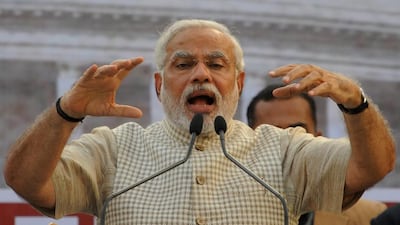Foreign Correspondent
NEW DELHI // Muslims in India were conflicted about the next five years after election results overwhelmingly endorsed a Hindu nationalist for prime minister.
India is home to roughly 180 million Muslims, nearly as many as in Pakistan. With a decisive victory for Narendra Modi and the Bharatiya Janata Party, there are fears that Mr Modi’s past will haunt the Muslim community.
Mr Modi had just become the chief minister of Gujarat when anti-Muslim riots broke out in the state in 2002. More than 1,000 Muslims died, and Mr Modi was accused by human-rights activists of failing to stop, or even abetting, the rioters.
While he was cleared of any wrongdoing in an investigation ordered by the supreme court, the stigma remains. Mamata Banerjee, leader of the West Bengal-based Trinamool Congress party, dubbed him the “butcher of Gujarat” last month.
Mr Modi used the campaign to temper his image, but for Fahad Shah, a student from Kashmir at the School of Oriental and African Studies in London, the prime minister’s past is “worrisome”.
Mr Modi may not engage in anti-Muslim activities as prime minister, Mr Shah said, “but the Hindu right wing on the ground will get a boost because of him”.
The Hindu right “sees Muslims as a threat to their idea of India, which is a Hindu India”, Mr Shah said. “So Muslims, as a minority, will not feel secure. They’ll feel threatened.”
Muslim leaders have spoken out against Mr Modi as well. Asaduddin Owaisi, president of the All India Majlis-e-Ittehad-ul Muslimeen, last month compared Mr Modi to Adolf Hitler.
However, Mr Modi and the BJP did relatively well in Muslim-dominated areas. In the state of Jammu and Kashmir, for example, the BJP got 32.4 per cent of the vote – the most of any party.
One reason, said Sohail Ahmed, a postgraduate engineering student in Mumbai, might be that “the Muslims feel let down even by the Congress”.
“The Congress claims to fight for minorities, but in its way it is as hypocritical and manipulative about this as any other party,” Mr Ahmed said. “And there’s also a recognition that if Modi really improves the economy, as he promises to, then we benefit as well.”
Syed Khalid, a Muslim leader in West Bengal, said Mr Modi had changed over the years and become more responsible.
“This is not a vote on communal lines. This is a vote for development and for jobs. We respect the people’s verdict and we think Modi will have to be a responsible leader,” he said.
On the other side of the country in Ahmedabad, Gujarat’s largest city, the Muslim businessman Salim Quadri agreed.
“We have seen Narendra Modi as the chief minister of Gujarat since 2001. I don’t think there is any need for any fear or apprehensions with Modi as prime minister,” he said.
“The only thing that worries Muslims is that they are already marginalised and Modi now should take steps to bring the community into the national mainstream.”
Yet in Juhapura, a Muslim township of about 400,000 in Ahmedabad, there was no sign of the celebrations over Mr Modi’s victory that broke out elsewhere in the state.
Television sets showing live coverage of the results flickered in homes across the community, but most people went about their business in the sprawling district that many Hindus derisively call “Little Pakistan”.
Asif Pathan, a Muslim social activist in Ahmedabad, said the people of India had warmed to Mr Modi’s promises of growth and development. Muslims hope he will stick to that, and not stray into divisive policies.
“He has said he wants to take everyone along. We would like to see that, but frankly we are not very confident,” he said.
ssubramanian@thenational.ae
* With additional reporting by Reuters

